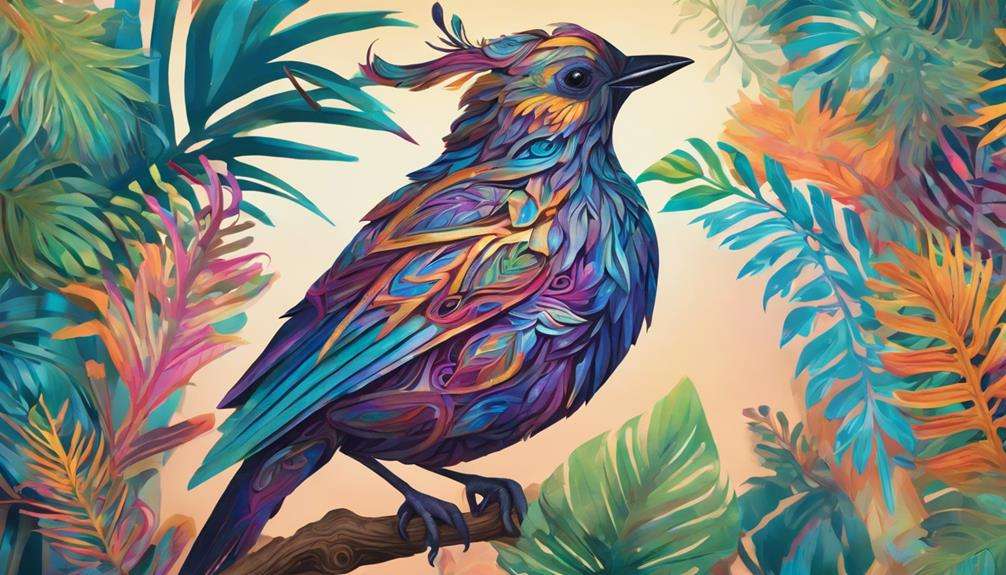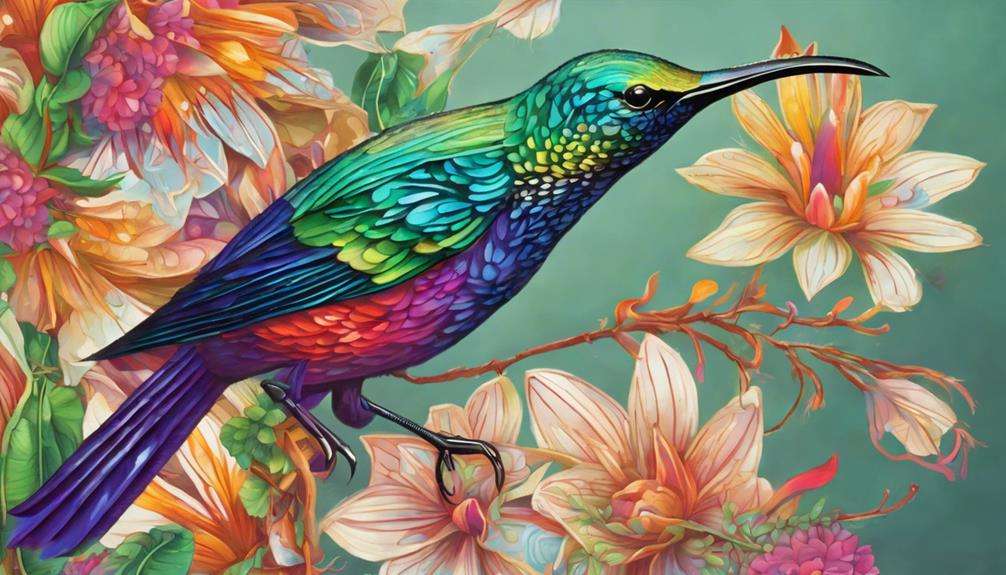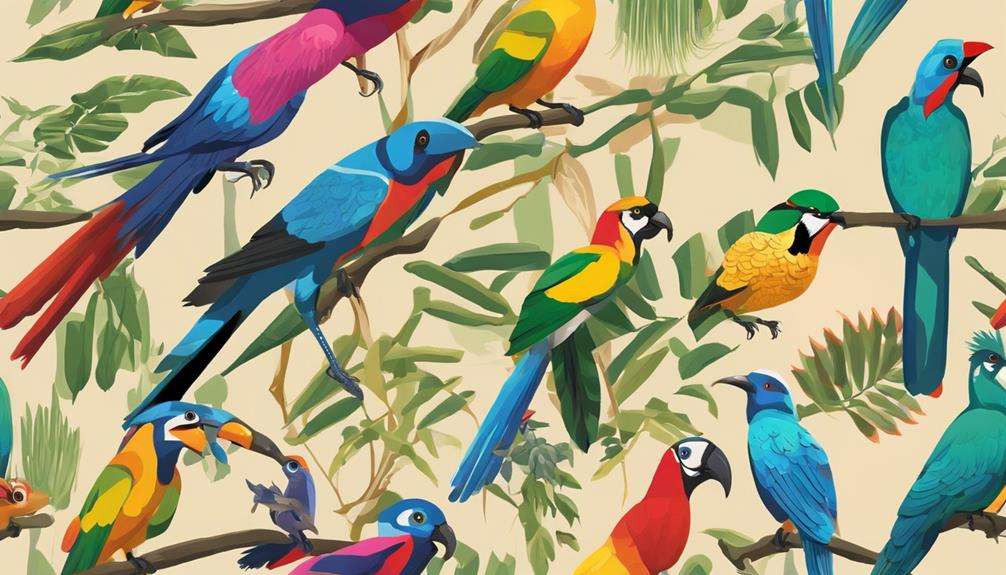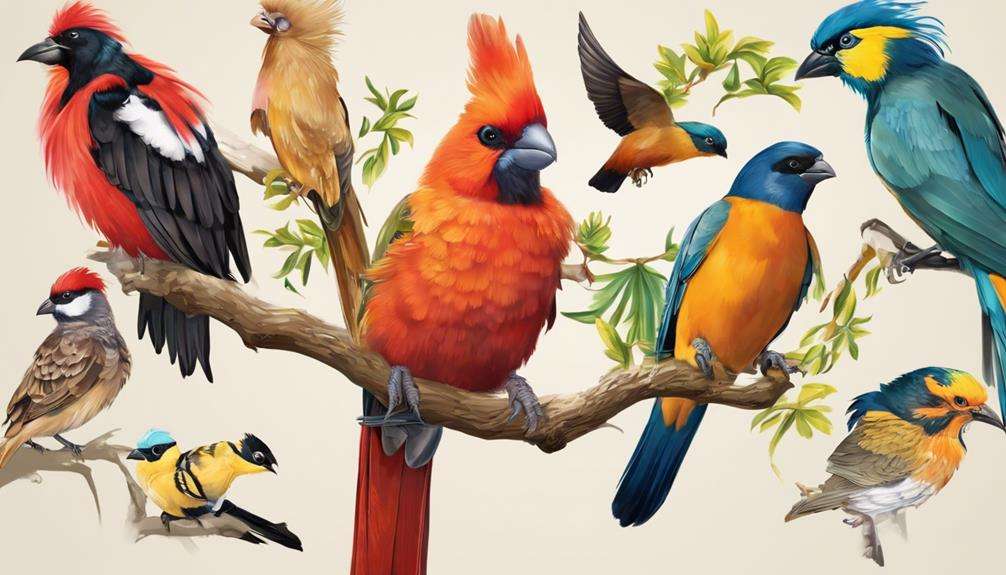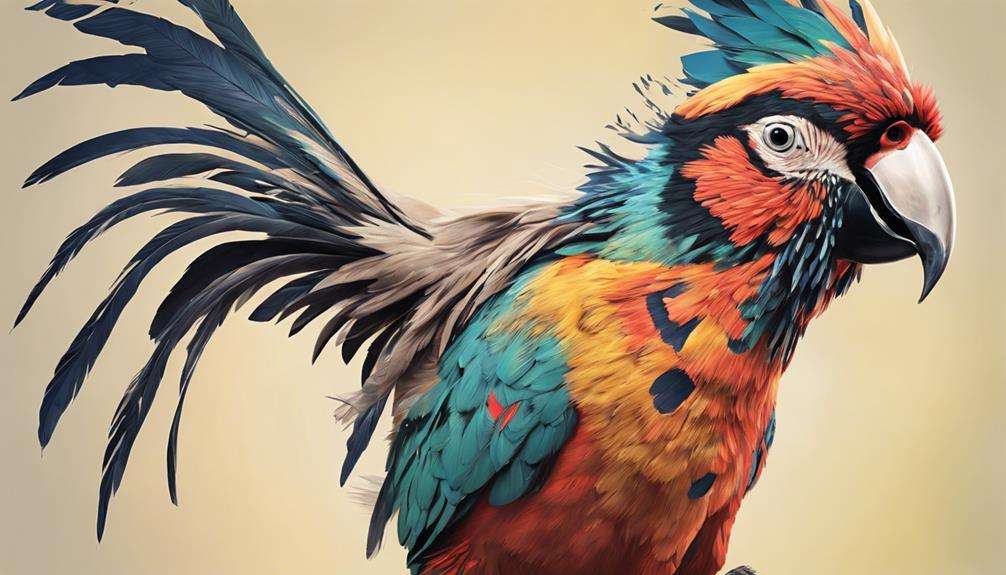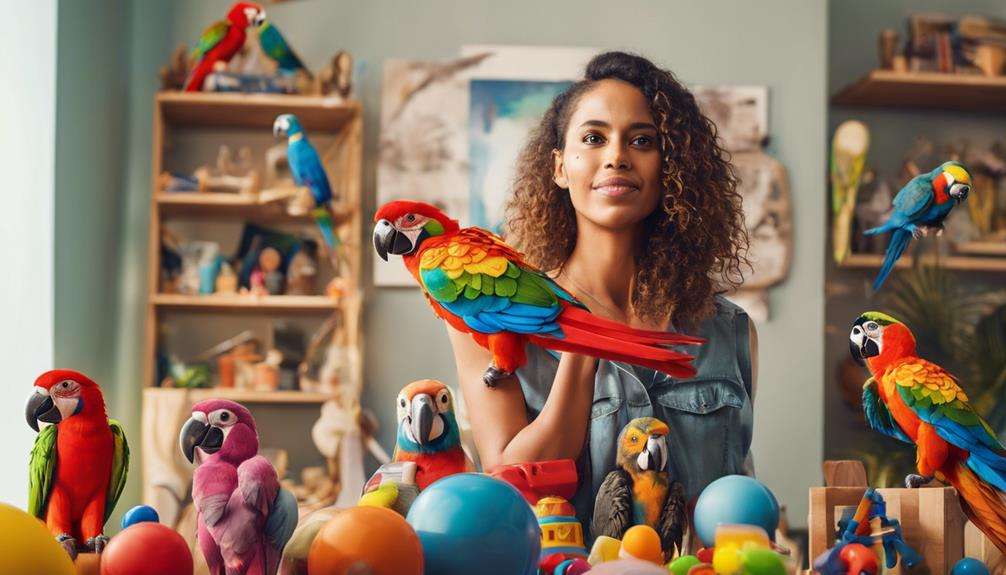Curious about adding an uncommon bird species to your home? Ever wondered what it takes to care for these unique avian companions? Envision the thrill of owning a rare feathered friend that captivates with its beauty and charm.
Set out on a journey through the world of exotic birds, where each species holds its own allure and challenges. Discover the secrets to providing the best care, creating a harmonious environment, and forming a special bond with these extraordinary creatures.
Key Takeaways
- Explore diverse exotic avian species for engaging companionship.
- Choose licensed breeders for legal acquisition of unique birds.
- Provide balanced nutrition and spacious housing for uncommon avian pets.
- Implement enrichment activities to promote mental and physical well-being.
Exotic Avian Species Overview
Examine a diverse array of exotic avian species, each boasting unique characteristics and fascinating traits that make them engaging subjects for bird enthusiasts and pet owners alike. Among these exotic birds are the Australian King Parrots, medium-sized birds native to eastern Australia. The males of this species display a stunning bright red head, adding a vibrant splash of color to any aviary. With a lifespan of up to 30 years, these birds can provide long-lasting companionship to those who choose to keep them as pets.
Another intriguing species to ponder is the Victoria Crowned Pigeon, large birds hailing from New Guinea. Named after Queen Victoria, these pigeons are known for their striking appearance and can live for an impressive 30-35 years. Their majestic presence and unique characteristics make them a prized addition for bird enthusiasts looking to care for uncommon pet birds. Explore the world of exotic avian species and discover the joy of keeping these remarkable creatures in your home.
Unique Bird Species Selection Guide
As you venture into selecting unique bird species for your aviary, consider the distinct characteristics and care requirements of each fascinating avian breed. When looking for a rare bird to add to your collection, explore options like the Ayam Cemani Chicken, known for its striking all-black appearance resulting from a genetic mutation. Another intriguing choice could be the Toco Toucan, which stands out for its vibrant, oversized bill and is among the few toucan species suitable as pets.
To make sure a legal and safe acquisition, seek out licensed breeders specializing in exotic birds. It's important to verify the reputation, reviews, and location of the seller before purchasing a rare bird to guarantee authenticity. Before making a decision, carefully examine the unique traits and specific care requirements of each species. Being well-informed about the needs of these uncommon avian pets will help you provide them with a suitable environment and guarantee their well-being in your care.
Uncommon Avian Pets Care Tips
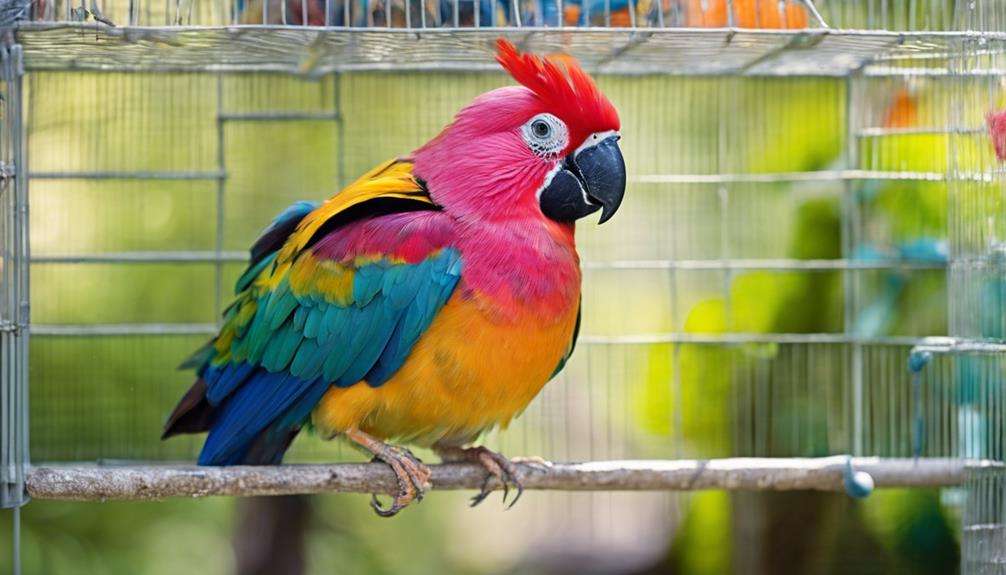
To properly care for uncommon avian pets, ensuring a well-balanced diet tailored to their specific nutritional needs is essential.
Providing spacious enclosures that accommodate their size requirements is vital for their physical health and well-being.
Implementing enrichment activities that stimulate their natural behaviors and prevent boredom is key to maintaining the mental health of unique bird species.
Avian Diet Essentials
For uncommon avian pets, such as the Victoria Crowned Pigeon and Hyacinth Macaws, a well-rounded diet rich in fruits, nuts, seeds, and vegetables is essential to guarantee their peak health and thriving in captivity.
Hyacinth Macaws, known for their vibrant blue feathers, require a balanced diet that includes nuts for healthy fats, fruits for vitamins, and vegetables for essential nutrients.
African Grey Parrots, another uncommon avian species, thrive on a diet high in fruits like apples and berries, nuts such as walnuts, and leafy greens like kale.
Providing a diverse diet guarantees that these unique birds receive all the necessary nutrients to maintain their well-being, vibrant colors, and energetic personalities in captivity.
Housing Requirements Overview
Uncommon avian pets with specific housing needs often require spacious aviaries or large, sturdy cages designed to accommodate their natural behaviors and physical characteristics. For example, the African Red Head is a unique bird species that demands an environment allowing ample room for flight and exercise. These birds are known for their vibrant plumage and active personalities, necessitating a habitat that promotes their well-being.
Providing a cage with horizontal space for movement and vertical height for perching is vital for the African Red Head's overall health. Additionally, incorporating perches and toys that encourage mental stimulation and physical activity can enhance the bird's quality of life. Understanding and meeting these housing requirements are essential for ensuring the comfort and happiness of uncommon avian pets like the African Red Head.
Behavioral Enrichment Ideas
Incorporating behavioral enrichment activities is key to ensuring the overall well-being and mental stimulation of your uncommon avian pets. For parrots, providing foraging opportunities is essential. You can hide treats in toys or paper bags to stimulate their natural behaviors.
Additionally, offering a variety of perches with different textures and diameters promotes foot health and provides exercise. Introduce puzzle feeders or food-dispensing toys to encourage mental stimulation and problem-solving skills.
Rotate and introduce new toys regularly to prevent boredom and keep your parrots engaged and mentally active. Creating a safe outdoor aviary or supervised play area allows your uncommon pet birds to experience natural sunlight and fresh air, contributing to their overall well-being and happiness.
Rare Bird Species Housing Needs
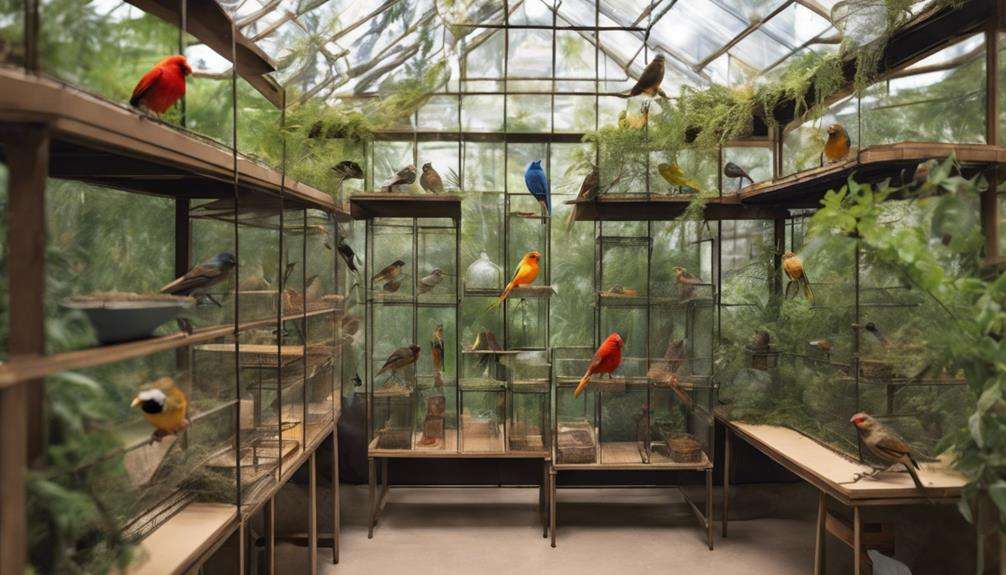
Rare bird species necessitate specialized housing to meet their distinct requirements based on their natural habits and environmental needs. Understanding the unique needs of rare bird species is critical in providing them with suitable living conditions.
Factors such as cage size, temperature, lighting, and enrichment are vital in catering to the housing needs of rare bird species. Some exotic bird species may even require specialized enclosures or aviaries to replicate their natural habitats accurately.
It's essential to conduct thorough research and consult with avian experts to make sure that the housing provided meets the specific requirements of these rare bird species, offering a comfortable and stimulating environment. By mimicking their natural surroundings as closely as possible, you can help guarantee the health and well-being of these unique avian companions.
Proper housing plays a significant role in the overall care and happiness of rare bird species, so investing time and effort into creating an appropriate living space is paramount.
Exotic Bird Diet Recommendations
When considering the diet of exotic birds, it's important to provide a balanced mix of seeds, pellets, fruits, and vegetables to meet their nutritional needs. Consult with professionals like avian veterinarians or bird nutritionists to tailor a diet plan suitable for your bird's species.
Be mindful of toxic foods like avocado, chocolate, and caffeine, and consider enriching their feeding routine with mental and physical stimulation.
Nutritional Needs Overview
For best health and well-being, exotic birds require a diverse diet that includes fruits, vegetables, nuts, seeds, and specialized pellets to meet their specific nutritional needs. Different species have varying requirements; for example, African greys need a diet rich in calcium to support their bone health, while Golden Conures benefit from vitamin A-rich foods like carrots and sweet potatoes for vibrant plumage.
Consulting with an avian veterinarian or a bird nutritionist is important to tailor a balanced diet plan to your exotic bird's species-specific needs. Avoid feeding toxic foods like avocado, chocolate, caffeine, and high-salt or sugary treats to guarantee their overall health.
Regularly monitoring your bird's weight, appearance, and droppings can help you assess their nutritional status and make any necessary adjustments to their diet.
Dietary Restrictions for Birds
Exotic bird species, such as the Hyacinth Macaw, thrive on a diet rich in nuts, seeds, fruits, and vegetables to support their overall health and well-being.
For unique birds like the Black Palm Cockatoo, it's important to provide a varied diet that includes protein sources like cooked meat or insects.
Rare species such as the Victoria Crowned Pigeon may have specific dietary needs, requiring specialized pellets and grains.
Supplements like calcium and vitamins can benefit birds like the Golden Conure, ensuring best health.
Understanding and meeting the dietary restrictions and preferences of uncommon bird species are essential for their well-being and longevity in captivity. By offering a diverse and balanced diet tailored to each species, you can help your exotic bird lead a healthy and fulfilling life.
Unusual Bird Behavior Insights
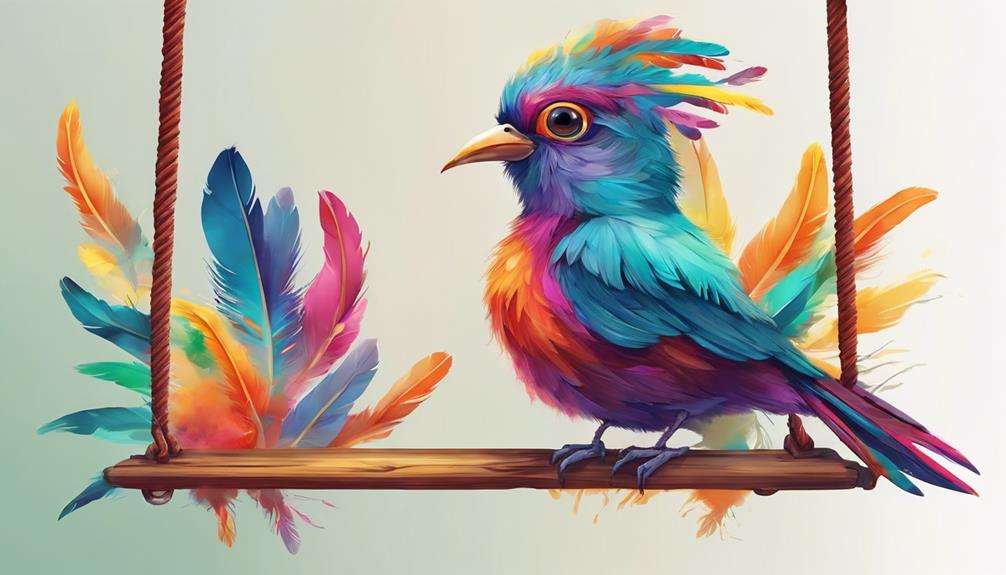
Birds demonstrate a myriad of unique behaviors, from head bobbing to complex dances, all serving as important communication tools in their interactions with the environment and other birds. Understanding these unusual behaviors and bird body language is key to interpreting their social interactions and emotional states.
Birds engage in behaviors like regurgitation, where they bring up food to feed their young or bond with a mate. Allopreening, the act of one bird grooming another, promotes social bonding and reinforces relationships within a flock or pair. Territorial displays, such as aggressive posturing and vocalizations, are common among birds to establish boundaries and defend their nesting sites.
Additionally, signs of aggression, fear, or stress can be observed through body language, vocalizations, and changes in feather position. By paying close attention to these behavioral cues, you can better understand your bird's needs, emotions, and overall well-being.
Uncommon Avian Health Considerations
Bird health considerations extend beyond common ailments, requiring specialized attention and care to address unique issues such as egg binding and respiratory problems, especially important when dealing with rare species. Avian health in uncommon bird species demands vigilant monitoring for warning signs of illness like erratic behavior, changes in waste consistency, and loss of appetite.
Recognizing signs of discomfort or distress is essential for their well-being. Early detection of health issues is key in providing prompt veterinary care. Maintaining good bird health in rare species necessitates a proper diet tailored to their specific needs, ensuring a suitable environment, and engaging enrichment activities.
Regular veterinary check-ups are essential to assess overall health and catch any potential problems early. By being proactive in monitoring and addressing avian health concerns in uncommon bird species, you can guarantee the well-being and longevity of your feathered companions.
Exotic Bird Species Legalities
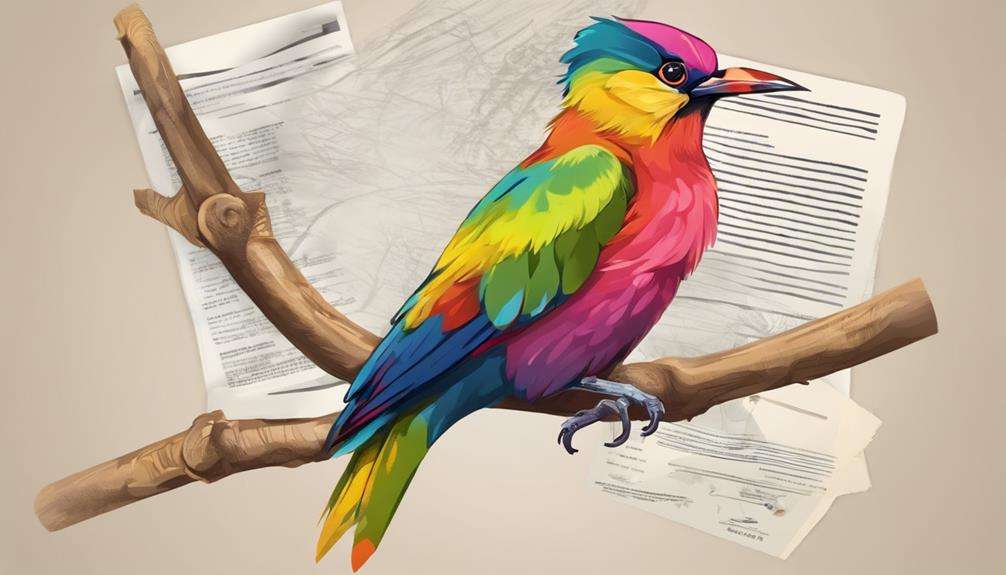
To guarantee compliance with regulations governing ownership of rare avian species, thorough research on local wildlife laws and permit requirements is imperative. When considering exotic bird species as pets, it's vital to understand the legalities involved.
Some exotic bird species may be protected under wildlife conservation laws due to their rarity or endangered status. This protection means that owning these birds without the necessary permits or licenses can lead to fines or legal consequences. Before acquiring an exotic bird species, it's essential to check with local authorities or avian experts to make sure that you're following the correct legal procedures.
Illegal possession of exotic birds not only harms the individual birds but also contributes to the decline of already vulnerable species. By abiding by legal requirements, you can help support conservation efforts and ensure the well-being of the exotic bird species you wish to keep. Remember, staying informed about legalities surrounding exotic bird ownership is a fundamental part of being a responsible pet owner.
Rare Bird Species Acquisition Guide
Researching reputable sources for acquiring rare bird species is essential when expanding your avian collection responsibly. When seeking rare bird species, it's critical to purchase from reputable breeders who specialize in the particular species you're interested in. These breeders have the expertise needed to guarantee the health and authenticity of the birds.
Due to the rarity of these species, you may need to join waitlists as they may not be readily available for immediate purchase. Attending exotic animal shows can also be a valuable way to find reputable dealers offering rare bird species. It's advisable to avoid purchasing rare birds online to guarantee the bird's well-being and legitimacy.
Before making a purchase, verify the credibility of the seller by checking for public reviews, feedback, and their business location. By following these guidelines, you can acquire rare bird species ethically and responsibly.
Frequently Asked Questions
What Is the Most Exotic Bird You Can Own?
When considering exotic bird ownership, the Hyacinth Macaw stands out as the most striking choice. Their vibrant blue plumage and impressive size make them a unique addition to your aviary. Guarantee proper care for this majestic bird.
What Is the Rarest Bird You Can Buy?
Looking for the rarest bird you can buy? Have you considered the Spix's Macaw? This endangered species requires dedicated conservation efforts and breeding programs to survive. Captive breeding is vital for the future of these magnificent birds.
What Is the Best Type of Bird to Keep as a Pet?
When choosing a pet bird, consider popular choices like cockatiels, lovebirds, conures, Quaker parrots, and Senegal parrots. These unique bird breeds offer various traits such as sociability, intelligence, playfulness, and mimicry, enriching your experience as a bird owner.
What Is the Most Rehomed Bird?
When considering rehomed parrots, it's essential to understand avian behavior. Many factors, like high maintenance needs and long lifespans, contribute to parrots being surrendered. Proper care and research can prevent rehoming issues.
Conclusion
Congratulations on completing your journey into the world of uncommon bird species! With this guide, you're now equipped to commence on the extraordinary adventure of owning and caring for these exotic feathered companions.
Remember, the bond you'll form with these rare avian friends will be as strong as steel, and the joy they bring will soar higher than the highest mountain peaks.
Happy bird-keeping!

